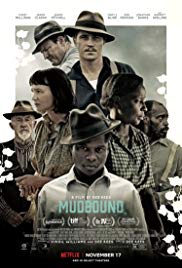
MUDBOUND
US, 2017, 134 minutes, Colour.
Carey Mulligan, Jason Clarke, Garrett Hedlund, Jonathan Banks, Dylan Arnold, Jason Mitchell, Mary J.Blige, Kerry Cahill, Rob Morgan.
Directed by Dee Rees.
Mudbound is a striking film about racism in the American South in the setting of the 1940s in the background of American participation in World War II.
The film establishes the poverty of the south, the farms and the workers, struggles for survival, selling up properties and moving, dependence. This is dramatised in the story of a farmer, played by Jason Clarke, and the tense relationship with his wife, Carey Mulligan.
The war enters into the families both of the wealthy and the poor, young men going to war, their experiences, returning, post-traumatic stress, interactions despite the prejudices of the families.
The film shows vividly the life of the African -Americans in the situations, the parallels with the whites, sons going to war, difficulties on return, prejudice against them – especially in the bitter character played by Jonathan Banks.
The film was written and directed by Dee Rees who had made the small budget film about teenagers, the use and misuse of mobile phones, judgement and their consequences, Pariah (2011). She received an Oscar nomination for her screenplay here. The film also had nominations for music and the original song composed and sung by Mary J Blige who also appears in the film.
1. The reputation of this film? Its impact? For American audiences? Worldwide audiences? The impact for African- American audiences? White audiences?
2. A 21st-century perspective on American history, the 1940s? Mississippi, towns and communities, farmers? The slavery tradition? The places of black and white? The racism? The wall, the war experience, post-traumatic stress disorder, changes because of World War II?
3. The title, the visuals of the mud, the soil and the rain, digging graves, floods? Walking in the mud? The crops and the rain? Stuck in the mud? Mud as a symbol?
4. Races in Mississippi at the time, the inheritance of slavery, the South, African- Americans and their status, socially subservient, segregation and its effect, managing despite the difficulties, suspicious? The contrast with the whites, their status, taking their status for granted, ingrained racism, blood superiority and exploiting it, religious background? Superior? The ordinary whites, and educated, angry and violent? The Ku Klux Klan and torturing?
5. The range of stories, the different voices, the different perspectives, the screenplay and its mixture of the storytelling, the images and the stories, the information, visualising the attitudes of life in Mississippi?
6. Henry and Jamie, the opening with the digging of the grave, their arguments, the flood, Henry saving Jamie? The burial of the Father? The sequence and its recurrence? The presence of Laura and the children? Hap and his family passing by, getting their help? The sequences as a framework for the events of 1940-1946?
7. The range of stories, the different voices, the different perspectives, pieces of the puzzle? The visuals, the sound, the information, the perspectives?
8. The African- American family, their status, poor, in Mississippi? The farm, the large family, making ends meet? Hap, the father, his work, incapacitated, his trying to work, further injury? His wife and her support? The rest of the members of the family?
9. The outbreak of the war? The effect on each family? On the African- American family? Ronsel, his age, leaving for the war? Jamie and his going to war? His dapper personality?
10. The war sequences, the fighting in France and Belgium, the race issues, comradeship? Land fighting? The sequences, bombs, deaths? The effect on Ronsel, on Jamie? Ronsel and the girl, the sexual encounter, later the letter and the news about the son?
11. Henry and Laura, their life, the hard work, the marriage, Jamie’s presence? Henry’s deals, the work, his being swindled, the moving to Mississippi, the hard work, the life, the children? The experience of the war? The relationship with Hap and his family?
12. Henry’s father, the absolute bigotry, criticising Laura, his friends, the drinking, talking? His going with Henry and the family and staying with them? After the war, the taunting of Ronsel, wanting him to go to out the back door of the shop? Reading the letter? The men taking him, humiliating him, torturing him? The Ku Klux Klan the meetings?
13. Jamie on his return, the effect of the war, the loss of friends, jobs? The friendship with Ronsel, spending time together, giving lifts? The bigotry and his father brutality – and Jamie eventually smothering him?
14. Henry, in between, the white status, the treatment of African- Americans, between all?
15. The effect on Laura, over the years, the relationship with Henry? The children? Jamie’s return, her passion for him?
16. The uncertainties of postwar America, Henry and Laura on the farm, Jamie and his leaving, Ronsel and his returning to Berlin to find his child?
17. A film of the 21st-century and its retrospective, perspectives and judgements?